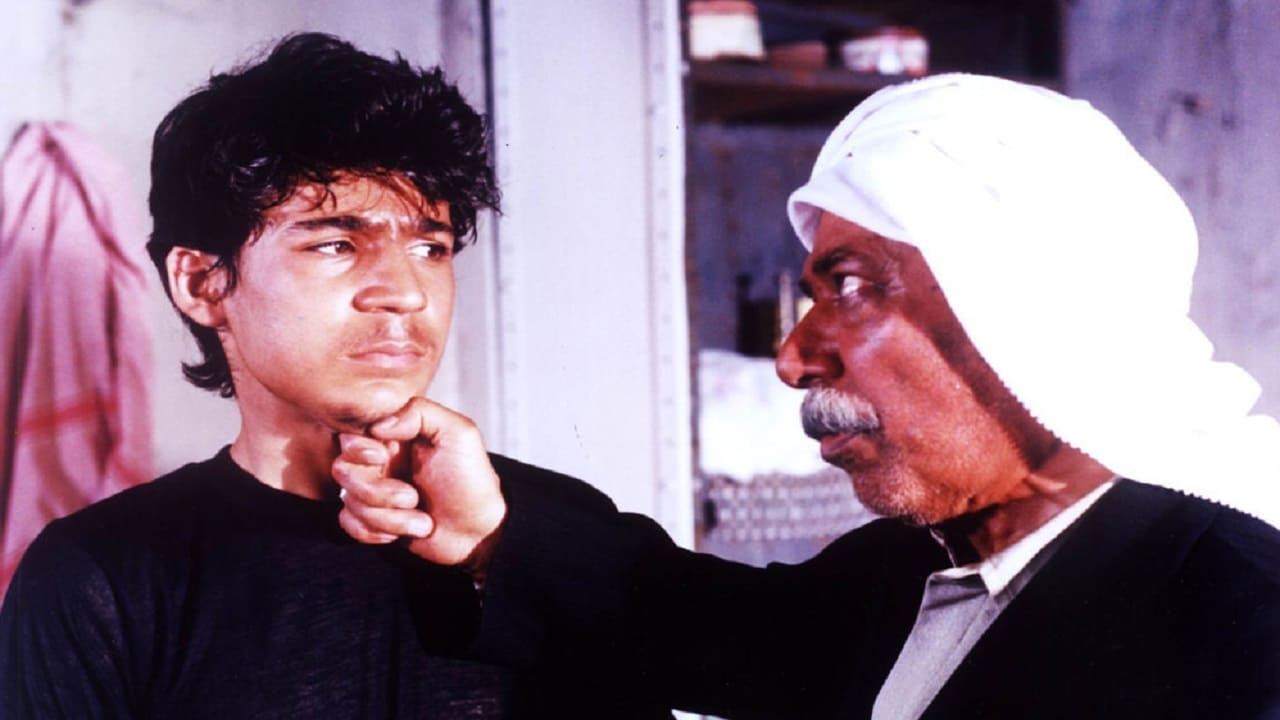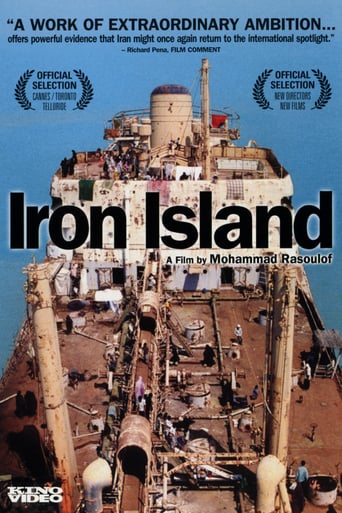Hellen
I like the storyline of this show,it attract me so much
Interesteg
What makes it different from others?
Asad Almond
A clunky actioner with a handful of cool moments.
Allissa
.Like the great film, it's made with a great deal of visible affection both in front of and behind the camera.
anikgol
While the works of maestro Kiarostami and Makhmalbaf are part of a more philosophical, sometimes Godardian/Haneke avant garde film school, Iron Island represents another side of iranian cinema, one that is closer to the classic "greek" Hollywood style. The plot driven film. But this is a plot driven film that also uses the plot to present a satire of the society. Not only the iranian but a more general comment on the modern society. The director is very precise and throughoughly chooses simple but strong symbols on presenting his work. A miniatyre society (on a rusty old oil tanker in the persian gulf that is constantly sinking) lead by captain Nemat. There is a fully (dis)functional society on this boat. Nemat is a strong totalitarian leader but a balanced person thats very hard to judge. Nemats complex character is one of the most well crafted and vital parts of this film. There is also a love story off course. A forbidden love between two of the youths on this boat. Nemat, these two youths a teacher/scientist and dozen of other characters each represent a person and a way of thinking that in addition to being autonome characters also are used to show Nemat. These persons are also used to show Nemat, by showing Nemats reaction to these people.Also the imagery is fantastic. The old rusty tanker a great contrast to the blue sea. Brown and yellow against the blue sea and the sky. Nemats (Nassirian is one of the most important theatre and film actors in Iran) face expressions alone, are just incredible (one can see parallels in the use of face expression to Eisensteins "Potemkin").In short, Iron Island is one of the most interesting Iranian films in a long time.
noralee
"Iron Island (Jazireh ahani)" vividly works on at least three levels. Opening with a prayer, the premise itself is visually arresting and the story is simple but imaginative. Settled on an abandoned oil freighter off the coast of an unnamed Middle East peninsula, a rag tag community of squatters is ruled by a wheeling-dealing landlord, a benevolent, Messianic dictator of a captain, like out of a Werner Herzog film, controlling a limited barter economy with the outside world. The huge hulking ship in the bright blue sea is eye-popping, but it even feels like writer/director Mohammad Rasoulof is just pointing his camera at at a documentary of how traditional families adapt to such a physical and economic environment while retaining their social structure with its rigid gender and age stratification. I equally believed, on the one hand, this could be a post-apocalyptic society as in the "Mad Max" movies or "Waterworld", the new "Battlestar Galactica" or even "Land of the Dead" or, on the other, that it could even have been based on a true story, as much as "Nobody Knows (Dare mo shiranai)" was based on a real incident in Japan of abandoned children.But it works equally well visually, emotionally and intellectually as a brilliant allegory, not necessarily of Iran but of any traditional, isolated society with a rotting infrastructure, selling off its resources and émigrés to global capitalism and living off the promises and lies of its paternalistic leaders.Working under the captain's watchful eye, the frustrated school teacher, a Cassandra-like scientist, uses the Islamic madrassas style of repetitive memorization. But with only old newspapers about a mysterious war and enemy as texts, the students are required to repeat truisms about the glories of living on the sea. Unfortunately, the English subtitles do not translate what is on the black board so some subtleties are doubtless lost.Just as any society has channeled restless adolescent boys into armies, the "Captain" (a marvelously oily and charismatic Ali Nassirian) organizes the boys on board into teams of coordinated manual labor to salvage resources on the ship that have the breathtaking look of "Nanook of the North" teams ritualistically pulling together for a common goal and their choreography is a wonder. Even so, they still keep trying to get snatches of contact to the outside world with satellite TV and radio.But we get caught up on in the story of one of these adolescents, his assistant, a lovelorn orphan (played by Hossein Farzi-Zadeh who also movingly played a similar young man in "Beautiful City (Shah-re ziba)"), who stands up to him, recalling "Loneliness of the Long Distance Runner", or a more cerebral "Star Wars", with an even more dramatically wrenching rebellion. How young love finds an outlet even through elaborate burhkas is a touching tribute to the universality of the human spirit. The audience held their breaths as to who would win the battle of wits and endurance.Women are especially ground under in this patriarchal society, with physical and labor restrictions and barely puberty arranged marriages around issues of honor. A lack of health care particularly affects the constantly pregnant, child-caring women.The premise doesn't make 100% practical sense and the ending is so ambiguous that the guy next to me optimistically thought it was happy for all, while I was cynically dismayed. But the images are unforgettable.
paterfam001
I was most impressed by this movie, especially since I was going to it (with my wife) out of a sense of duty: it wasn't one of my choices at Toronto Film Festival. Frankly, I expected to be baffled and bored, as I have been by terribly earnest subtitled movies in the past. I was pleasantly surprised to find that it held my interest from the first scene. The unusual setting had a great deal to do with this -- the ship's crumbling superstructure, its dank and scary innards, the small domestic comforts of its tenants, the vast watery landscape outside -- all beautifully filmed. You are dumped right into the middle of all this, as if you were one of the tenants newly arrived, and watch a newbie get the full treatment from the Captain -- the leader and self-styled benefactor of this band of poor outcasts. You find your way around and get to know the people and their ways, but this is not a documentary, nor does it pretend to be. Our interest is not sociological, but just human. The Captain is at the centre of all this, and his character is at issue throughout. Is he really a saviour and benefactor, or is he just using the young men on board as a source of cheap (free, actually) labour so he can steal the remaining crude oil and valuable parts from the ship, before its owners send it to be cut up for scrap? By the time you have absorbed enough of the narrative to wonder about this, you have grown acquainted enough with the tenants' problems and aspirations to care deeply about this, and to follow his actions with keen attention. In the end, the viewer has to make up his own mind about the character of the man, the rightness of his actions. There is no foregone conclusion.
Richard
I saw this film at the 2005 Toronto International Film Festival.Iron Island is the second feature film from Iranian director Mohammad Rasoulof, who also wrote the screenplay. Iron Island refers to an old, abandoned oil tanker floating in the Persian Gulf, populated with all sorts of people and presided over by Captain Nemat (Ali Nasirian). The ship is a miniature city, with its own school and barter economy, and Nemat is constantly running about, seeing to the needs of the people under his protection, while at the same time overseeing the gradual disassembly of the ship for scrap metal.The ship contains a whole coterie of characters, including the young man Nemat adopted who is in love with a girl betrothed to another man; the old man who is constantly looking out into the distance for who-knows-what; the young boy who is trying to rescue fish from the hold and return them to the ocean; the teacher who insists the boat is slowly sinking. Under threat from the authorities to abandon the ship, Nemat must decide what to do to keep his little city together.The film was enjoyable, and it was fascinating to watch the society that Nemat had built up on his own little floating island. The characters were absorbing to watch, especially Nemat, who seemed to be partially motivated out of love for his charges, and partly because he wouldn't know what to do with himself if he wasn't leading the people.Director Mohammad Rasoulof attended the screening and did a Q&A: - The film is about the isolation and loneliness of a society, but one that still has a beautiful life.The story is purely fictional.Nemat disconnects the people from the outside world from the moment they arrive, resulting in the people willing to follow or do whatever the captain wants. When a society is completely cut off from the outside, whatever is left rules you.The film has not yet screened in Iran; they are currently waiting permission that has been promised to them.Every film, poetic or not, goes back to the filmmaker and what they want to say; and this film is what Rasoulof wants to say.Any artistic work has many different layers, with the plot/story being the one on top. The same thing happens in different places, not just one society. The film is not a metaphor for Iran in particular.The script was originally written as a theatre piece 10 years ago. Rasoulof rewrote it two years ago, and put the ship as a character in it.The cast and crew of about 350 had to commute 10 km a day to the ship.The people in the area where filming took place are very religious and were uncomfortable with the idea of being in a film, so Rasoulof had to go to an area about 60 km away, where many of the people had emigrated from elsewhere, for his cast.Ali Nasirian, who plays Captain Nemat, is a renowned actor in Iran, and did a lot for the film.Each one of the characters in the film is based on someone Rasoulof knows. The little fish boy is based on his own childhood and that of his brother. The man watching the horizon is someone Rasoulof remembers from growing up. The teacher is someone he knows well.The idea for the ship just came to Rasoulof, and he wasn't sure how. He just said there are times one is inspired by such ideas.There is one scene when the older boys are watching satellite TV. The TV was originally supposed to be playing Titanic, starring Leonardo DiCaprio, but they couldn't get the copyright to do so.On the issue of censorship, Rasoulof said he basically made the movie he wanted to, and let the censors excise what they wanted.

